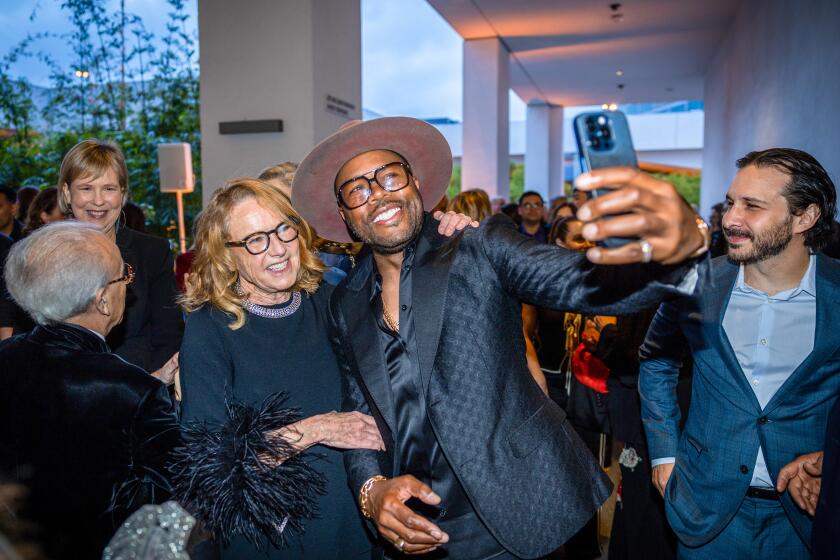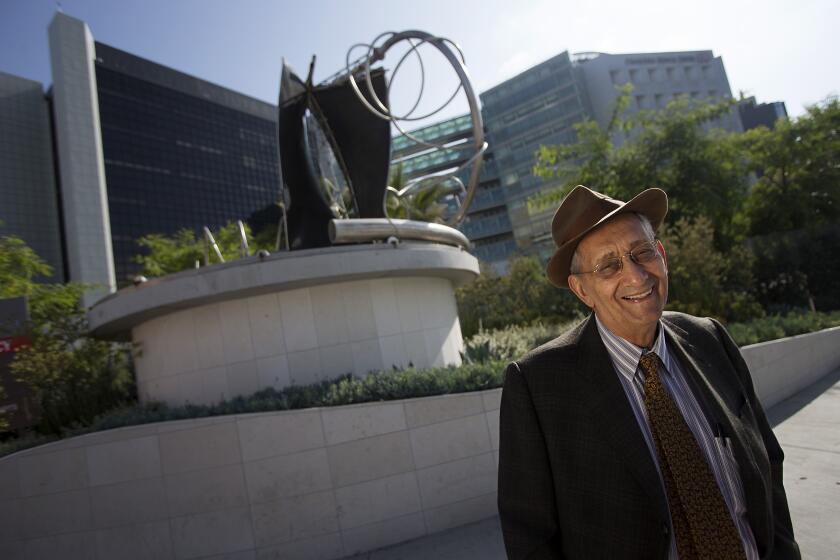A Summer of Final Atonement
Clumping down a hallway of the Santa Monica courthouse on one good leg, hunched slightly forward in a determined quest to get somewhere, Bill Bartman hardly seems like a man seeing his last summer.
There’s too much determination there, too much vigor to be owned by a guy dying of AIDS. Propelled by his own anger, he comes at you scowling with intensity, wanting you to hear, forcing you to listen, involving you with an energy difficult to avoid.
But ask him and Bartman will show you a declaration from two physicians that he probably has only six months to live. It’s dated last October. Since then his T-cell count has edged up slightly, partly from new medication but mostly, I suspect, from the determination that fuels his resolve.
Nevertheless, he knows that dying is probably close at hand and he’s got business to clear up before darkness descends. That business is a lawsuit against UCLA.
He’s suing the university, a doctor and the UCLA Police Department over an incident 18 months ago that has left him in a red-eyed rage. What began as a request for an apology has escalated into a demand for $30 million.
Filmmaker, teacher and book publisher, Bartman has hired a law firm and a publicist to fight what could be a final battle of his life.
“I didn’t want to do this,” he says. “I didn’t want this to be my legacy. But now that I’m doing it, I’ll do it right.”
*
Bartman, 50, has written, directed and produced for both the stage and the screen, including a 1982 film, “O’Hara’s Wife,” starring Ed Asner. He has taught high school English and is currently publishing limited-edition books about contemporary artists.
He was diagnosed with AIDS in 1986. His T-cell count was down to a disastrous 13 at one point and is now at 75. Normal is about 550. He lost his right leg to a bone infection and has suffered episodes of AIDS-related pneumonia and cancer. He walks with a prosthetic device on his leg.
Bartman does not, however, fit the perception of victim in the classic sense of cowering and whimpering away the last days of his life, connected to electronic monitors which, clicking and pinging, chart his final moments.
Damning the “incubation” of a hospital death, he plunged into a whole new career, founding A.R.T. Press, publishing books on artists and distributing them free to inner-city and rural libraries.
That was to have been his legacy until Feb. 9, 1995. According to Bartman, he had an appointment with a physician at the UCLA Medical Center to remove a cancerous lesion from his shoulder.
He tells this story: Although he has medical insurance, the physician demanded a signed blank check before he would treat him. Bartman was unable to furnish one, asked to see the physician in person, was refused and wouldn’t leave his office.
University police officers forcibly removed him from the office and cited him for disturbing the peace. The charge was later dropped. Bartman is suing for assault, battery, false arrest and violation of his civil rights.
A spokesman for the university says simply that the physician, who is not associated with UCLA, wanted co-payment before treatment and Bartman refused, became violent and was arrested when he wouldn’t leave the office.
*
Bartman insists that financial gain is not a motive for his suit, now being tried in Santa Monica Superior Court. What remains of his life is unlikely to benefit much from a legal victory. Any money he might win would go toward paying debts and furnishing books for libraries in need.
Bartman wants satisfaction for what he considers a moral wrong, but I think there’s more going on here.
The incident at UCLA Medical Center has diverted his attention and consumed what precious time remains, and that infuriates him. But, oddly, the rage also energizes him and propels him forward, stomping down courthouse halls, bursting with an almost evangelical drive for atonement.
Is his final priority, this seemingly impossible demand for justice, a wasteful effort in the dwindling hours? That’s not for me to say. There are commitments beyond logic that fire our dedications. Bartman is fixed on a course that only summer’s end will determine.
After spending time with him, thinking about his struggle, I came home to discover that a small, scrawny tree I had given up for dead had produced a single perfect peach. It glowed in a blend of soft pastels amid the limp greenery, a triumph of life over adversity.
Maybe that’s what we’re all about, what Bartman is all about: the completion of a single compelling deed in a summer that will pass before we know it.
Al Martinez can be reached via the Internet at al.martinez@latimes.com
More to Read
Start your day right
Sign up for Essential California for news, features and recommendations from the L.A. Times and beyond in your inbox six days a week.
You may occasionally receive promotional content from the Los Angeles Times.






